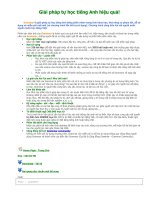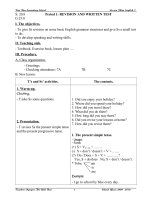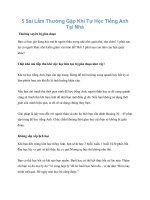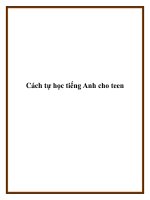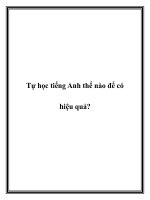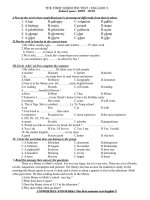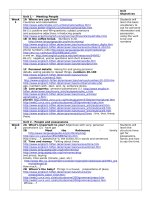Tự học Tiếng Anh 7
Bạn đang xem bản rút gọn của tài liệu. Xem và tải ngay bản đầy đủ của tài liệu tại đây (149.66 KB, 7 trang )
<span class='text_page_counter'>(1)</span><div class='page_container' data-page=1>
<b>TỔNG HỢP KIẾN THỨC UNIT 7, UNIT 8 – TIẾNG ANH 7</b>
<b>A. GRAMMAR.</b>
<b>1. Tính từ “ed” và “ing”</b>
Một tính từ có thể được thành lập bằng cách thêm “ed” hoặc “ing” sau động từ
- Sử dụng tính từ đuôi “ed” để mô tả cảm giác, cảm xúc của một ai khi bị một sự việc, vật tác động/
- Sử dụng tính từ đi “ing” để mơ tả về tính chất của vật việc
<b>2. Từ nối ALTHOUGH, DESPITE/INSPITE OF, HOWEVER, NEVERTHELESS</b>
Although/ though/eventhough/muchas+mệnhđề
Despite/in spiteof +cụmdanhtừ
Mệnh đề. However/ Nevertheless,(dấu phẩy) mệnh đề
<b>3. Câu hỏi với H/WH </b>
Các từ để hỏi Who, Why, Which, Whose, What, When, Where, How
<b>4. IT indicating distance </b>
It + be + (about) + distance + from...to...
Ex: It is about 300 meters from my house to the bus stop.
<b>5. Used to </b>
Sử dụng “used to” để mô tả một hành động, một thói quen hoặc một việc xảy ra thường xuyên trong quá khứ
nhưng bây giờ không còn nữa
<b>B. PRACTICE</b>
<b>PHONETICS</b>
<b>Question </b>
<b> I . Find the word which has different sound in the part underlined.</b>1. A. brainstorm B. sailing C. railway D. captain
2. A. plane B. safety C. traffic D. station
3. A. vehicle B. mention C. enter D. helicopter
4. A. <i>hey</i> B. <i>honey</i> C. obey D. grey
5. A. happy B. house C. here D. hour
6. A. maps B. papers C. cats D. books
7. A. pollution B. question C. education D. action
8. A. healthy B. ahead C. bread D. seatbelt
9. A. those B. there C. that D. thanks
10. A. walk<i>ed</i> B. open<i>ed</i> C. stopp<i>ed</i> D. watch<i>ed</i>
11. A. sound B. cloud C. found D. favourite
12. A. tool B. afternoon C. door D. school
13. A. played B. closed C. filled D. needed
14. A. mention B. question C. action D. education
15. A. frightened B. amazed C. disappointed D. terrified
16. A. thread B. beam C. breath D. stead
17. A. parade B. waste C. later D. gravy
18. A. populated B. loaded C. wanted D. lived
19. A. ahead B. bread C. pleasant D. seatbelt
20. A. energy B. flying C. chemistry D. technology.
21. A. naked B. cooked C. booked D. walked
22. A. stops B. laughs C. says D. claps
23. A. obey B. key C. grey D. survey
24. A. stayed B. washed C. filled D. annoyed
25. A. who B. when C. where D. what
26. A. embarrassed B. crowded C. excited D. divided
27. A. ahead B. instead C. seatbelt D. bread
28. A. left B. centre C. enter D. frighten
29. A. wanted B. filled C. stayed D. played
30. A. washed B. needed C. danced D. matched
<b>Question II. Find the word which has different stress pattern from the others.</b>
1.A. silent B. noisy C. pretty D. polite
</div>
<span class='text_page_counter'>(2)</span><div class='page_container' data-page=2>
3.A. agree B. hurry C. enter D. visit
4.A. describe B. fasten C. listen D. hover
5.A. degree B. student C. funny D. widen
6.A. traffic B. dancer C. cycling D. balloon
7. A. central B. gripping C. complete D. boring
8.A. answer B. listen C. enter D. obey
9.A. station B. healthy C. safety D. alone
10.A. tidy B. complete C. extend D. mistake
11. A. dangerous B. plentiful C. another D. limited
12. A. easily B. energy C. consumption D. negative
13.A. convenient B. abundant C. different D. expensive
14.A. petroleum B. advantage C. tendency D. enormous
15.A. attention B. pollution C. holiday D. effective
<b>B.VOCABULARY &GRAMMAR</b>
<b>Question I: Choose the correct answer to complete each following sentence by circling A, B, C or </b>
<b>D.</b>
1. Linda used to ________ morning exercise when she got up early.
A. did B. does C. doing D. do
2. My mum __________the bus to work every day, but I cycle.
A. catches B. drives C. goes D. runs
3. You should look right and left when you go ________the road.
A. down B. across C. up D. along
4. Bus is the main public ________in Viet Nam.
A.travel B. tricycle C. transport D. vehicle
5. The play was so boring. ________, An saw it from beginning to end.
A. Therefore B. Despite C. However D. Although
6. She’s sure that they will find the film_________.
A. entertaining B. entertain C. entertainment D. entertained
7. – “ Do you like seeing a film?” – “_________________”
A. No, I don’t like it at all B. Sure. What film shall we see?
C. Who is in it? D. I’m sorry, I can’t.
8. ____________ being frightened by the images, Lan still liked the film so much.
A. In spite B. Despite C. Although D. Nevertheless
9. ____________ is La Tomatina celebrated? – Every August.
A. Where B. Why C. When D. Which
10. My father liked the ____________ of that singer.
A. perform B. performer C. performance D. performing
11. Does your bike ever ________ down on the way to school.
A. break B. take C. do D. turn
12. I __________go on foot when I was in primary school.
A. used to B. break C. can D. may
13. Give a________ before you turn left or right.
A. signal B. turn C. sound D. sign
14. A lot of dancers go to Rio de Janeiro to ________the Carnival.
A. attend B. join C. perform D. appear
15. ________ the film was gripping, Tom slept from beginning to end.
A. Therefore B. Despite C. However D. Although
<b>Question II: Put the correct form of the verb in brackets:</b>
<b>1.He usually (go) ………. fishing on Saturdays.</b>
2.My brother used to ( go )……… to work by motorbike. Now he cycles.
3.How about (see) ………. a movie on Sunday evening ?
</div>
<span class='text_page_counter'>(3)</span><div class='page_container' data-page=3>
6.Last night, my father ( watch) ………..TV.
7.Ba (visit)……….. to Ha Long Bay this summer vacation.
8. I like ( work) ……….. as a volunteer for that orphanage.
<b>Question III: Complete the second sentence so that it has a similar meaning to the first.</b>
1. Did you often go to the beach when you lived in Nha Trang?
<i> Did you use </i>... ?
2. Linda doesn’t live with her parents any more.
<i> Linda used </i>...
3. I don’t have time to collect stamps as when I was in primary school.
<i> I used</i>...
4. He is not a poor man any more, but he becomes a rich businessman.
<i> He used </i>...
5. They didn’t often go to the cinema every Sunday last year.
<i> They didn’t use </i>...
6. My hair now is much longer than that in the past.
<i>In the past my hair used </i>... ...
7. I usually stayed up late to watch football matches last year, but now I don’t.
<i>I used</i>... ...
8. There were some trees in the field, but now there aren’t any.
<i> There used</i>...
<b>UNIT 8: FILMS</b>
I. Find the word which has a different sound in the part underlined
1.
A. animation
B. female
C. pavement
D. safety
2.
A. sign
B. critic
C. illegal
D. direct
3.
A. filled
B. wanted
C. played
D. opened
4.
A. recommend
B. seatbelt
C. vehicle
D. investigate
5.
A. cooked
B. talked
C. booked
D. naked
6.
A. delivered
B. clicked
C. promised
D. picked
7.
A. needed
B. developed
C. wanted
D. included
8.
A. liked
B. washed
C. loved
D. jumped
9.
A. acting
B. actor
C. address
D. action
10.
A. comedy
B. boring
C. shocked
D. long
</div>
<span class='text_page_counter'>(4)</span><div class='page_container' data-page=4>
1.
A. cinema
B. comedy
C. film
D. cartoon
2.
A. audience
B. character
C. actress
D. actor
3.
A. entertaining
B. terrifying
C. frightening
D. exciting
4.
A. enjoy
B. like
C. felling
D. annoy
5.
A. animation
B. romantic
C. science fiction
D. documentary
6.
A. interesting
B. exhausting
C. tired
D. exciting
7.
A. actor
B. comedy
C. director
D. editor
8.
A. entertaining
B. exciting
C. shocking
D. acting
9.
A. despite
B. in spite of
C. because of
D. although
10.
A. plot
B. documentary
C. horror
D. thriller
<b>II. Choose the best answer (A, B, C or D).</b>
1. I was
to learn that the director of that gripping film has won
the first prize.
A. interest
B. interests
C. interested
D. interesting
2. The film was so
. However my father saw it from beginning to
end.
A. interesting
B. exciting
C. boring
D. fascinating
3. We were
with the latest film of that director.
A. satisfied
B. satisfactory
C. satisfying
D. satisfy
4. We like the film very much. The
are unforgettable and the plot
gripping.
A. character
B. acting
C. style
D. action
5. I have never felt as
as I did when I watched that horror film.
A. terrify
B. terrified
C. terrifying
D. terrible
6. Not many people went to see the film;
it received good reviews
from critics.
A. although
B. but
C. despite
D. however
7. Let’s go to the Victor Cinema. I’m sure you’ll find the film
.
A. excites
B. excite
C. excited
D. exciting
8. Last night, I didn’t go to bed early
being very tired.
A. because of
B. although
C. despite of
D. in spite of
9.
they spent a lot of money on the film, it wasn’t a big success.
A. Nevertheless
B. However
C. When
D. Although
</div>
<span class='text_page_counter'>(5)</span><div class='page_container' data-page=5>
to the end.
A. moving
B. scary
C. violent
D. hilarious
11.
careful preparation, we have a lot of difficulties in making a
new film.
A. Such
B. However
C. Despite
D. With
12. A
is a film that shows real life events or stories.
A. documentary
B. thriller
C. comedy
D. action
13. I went to the cinema with my friends yesterday
feeling very
tired.
A. although
B. So
C. In spite of
D. but
14. The end of the film was so
that many people cried.
A. boring
B. shocking
C. exciting
D. moving
15. We didn’t find it funny
it was a comedy.
A. but
B. although
C. despite
D. in spite of
16. A
is a film that tries to make audiences laugh.
A. sci-fi
B. documentary
C. comedy
D. horror
17. I enjoy the film on TV yesterday evening
nobody in my family
liked it.
A. so
B. yet
C. although
D. in spite of
18. I found the book so
that I couldn’t put it down.
A. gripping
B. shocking
C. tiring
D. boring
19.
he spent too much money on the film, it wasn’t a big success.
A. But
B. Even
C. Despite
D. although
20. We found the plot of the film
.
A. bored
B. boring
C. interested
D. acting
<b>III. Complete the sentences, using although, despite, in spite of, however, or </b>
<i><b>nevertheless. Sometimes, two answers are possible.</b></i>
1. I think I did OK in my speech last night
I’d had almost
no sleep for 24 hours.
2.
_ I heard the telephone ring, I didn’t answer it.
3. We enjoyed our holiday
the rain.
</div>
<span class='text_page_counter'>(6)</span><div class='page_container' data-page=6>
to university.
5.
_ there was no electricity, I was able to read because I had
a candle.
6. She failed the test
she studied hard.
7.
difficulties, the firemen managed to save many people
who were caught in the fire.
8. Everyone thought she would accept the offer.
,
she turned it down.
9. Carol arrived at the meeting
I asked her not to be there.
10. It looks like they’re going to succeed
their
present difficulties.
11.
_ it was raining heavily, he went out without a raincoat.
12. My father is very busy.
, he is always willing to give a
hand with the housework.
13. The sky was grey and cloudy.
, we went to the beach.
14. Some English words have the same pronunciation
they
are spell differently, for example, dear and deer.
15. I was cold and wet
.Bob put on his swimming suit and
went to the beach.
<b>IV. Rewrite the sentences, using the words in the brackets. Change other words in </b>
<b>the sentence if necessary.</b>
1. The new restaurant looks good. It seems to have few customers. (however)
... ?
2. We planned to visit Petronas in the afternoon. We could not afford the
fee. (however)
...
3. Mary was sick. She didn’t leave the meeting until it ended. (despite)
...
4. We live in the same street. We rarely see each other. (in spite of)
...
5. I couldn’t sleep. I was tired. (in spite of)
...
6. They have little money. They are happy (despite)
...
7. My foot was hurt. I managed to walk to the nearest village. (although)
...
8. I’ve been too busy to answer by email. I’ll do it soon. (nevertheless)
</div>
<span class='text_page_counter'>(7)</span><div class='page_container' data-page=7>
this impossible. (although)
...
10. I got very wet in the rain. I had an umbrella. (although)
</div>
<!--links-->

